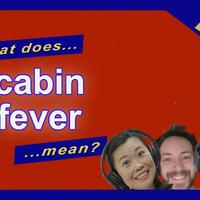Cabin fever: The English We Speak - YouTube
Hello and welcome to The English We Speak with me, Feifei
and me, Roy.
We may sound a little different – that's
because we are not able to record in our normal
studios during the coronavirus outbreak. There has
been a lot of discussion about self-isolation
and staying at home, and in this programme we have an
expression to talk about the stress
you may feel in that situation.
That's right Feifei. Today, we're going
to talk about ‘cabin fever'.
Cabin fever is the reaction to feeling
trapped or isolated in a building for too long.
It can be really stressful. This expression
probably comes from people being trapped and
not able to leave a small wooden house known
as a cabin. The may not have been able to
leave due to extreme weather conditions like
a snowstorm, as these buildings are often
found on mountains or hills.
People can become sad, restless and even lack
concentration. They may also get food cravings,
which in turn may lead to weight changes.
That's right. It's a really serious thing,
and it can cause you to suffer from anxiety.
Which is why we're going to tell you some
things that experts say you can do to help
you cope with cabin fever.
Yes, we'll let you know right after these
examples using the words ‘cabin fever'.
I started to suffer from cabin fever after
I was stuck at home for two weeks.
Some scientists think that cabin fever is
linked to the feeling of claustrophobia – the
fear of being in closed places.
He said he felt really anxious and that he
was suffering from cabin fever after not being
able to leave his house.
He also said he had gained weight.
This is The English We Speak from BBC Learning
English and we're talking about the expression
‘cabin fever', which is the feeling of
stress from isolation that some people experience
when they stay in a building for an extended time.
But apparently there are some ways that you
can cope if you're suffering from cabin
fever, aren't there Feifei?
That's right. One of the first things they
say to do is to set regular meal times, so
kind of like a routine – much like you would
have if you were going to work.
Yes, this helps regularity and limits binge
eating and weight issues. Also, it's important
to try and stimulate your mind.
Things like television are OK for distraction,
but they don't overly stimulate you.
Something like reading a book may be more interesting
and keep your mind active.
Yes, and doing things like puzzles or crosswords
can also help. I really enjoy doing quizzes online.
Also, you should make sure your friends and families
are coping if they are in the same situation.
Absolutely. A phone call to someone to check
on them may really help them, and you can
also give them the same advice we're giving
you now. Finally, it's important to set
goals. Try to achieve things in your day to
keep you focussed. You could even make weekly
goals depending on how long your isolation will be for.
Hey, why not try writing a book?
That's an idea. Bye, Roy.
Bye.

